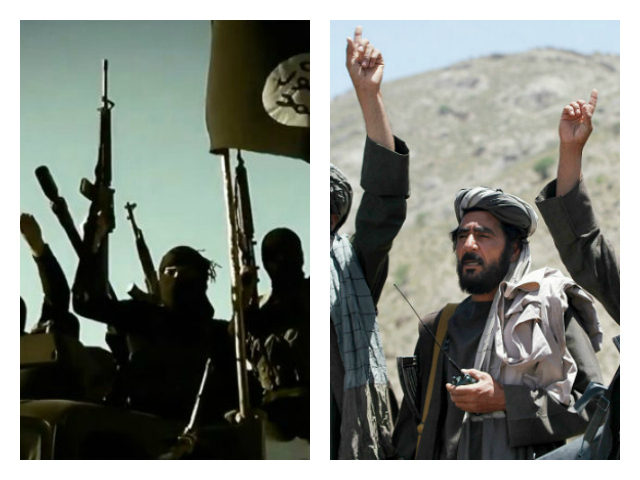The Afghan Taliban and the Islamic State branch in the region do not consider each other rivals, the national security adviser (NSA) to the president of Afghanistan told the Times of India (TOI), echoing other assessments of the relationship between the two Sunni jihadist groups.
Using an Arabic acronym for the Islamic State, also known as ISIS and ISIL, Hanif Atmar, Afghan President Ashraf Ghani’s NSA, told the Indian news outlet, “This idea that Taliban and Daesh are opposed to each other is wrong.”
ISIS jihadists in Afghanistan are not from Syria and Iraq, he added. Rather, they are the “morphing and mutating” of local groups, such as the Afghan Taliban, its Pakistani counterpart, and the Islamic Movement of Uzbekistan (IMU), into ISIS.
He added:
If you remove the Afghan Taliban from Daesh [ISIS] and other foreign terrorist groups, including Pakistani groups, then they will not have sanctuary in Afghanistan…The best way to defeat Daesh and other groups is first either defeat the Taliban militarily or if they prefer to have a principled peace, accept [the] Afghan constitution, cut ties with international terror groups and renounce violence.
Echoing the top U.S. commander in Afghanistan, Atmar dismissed allegations that the Taliban is fighting ISIS.
“People who are now saying that Daesh is the enemy of Taliban and Taliban will fight Daesh are wrong,” he declared. “We give them specific examples — there was a local dispute between Taliban and Daesh in Nangarhar, but Daesh and Taliban worked closely with each other in northeastern Afghanistan to fight us.”
In December 2016, Gen. John Nicholson, the top commander of American and NATO forces in Afghanistan, told reporters that Russia’s allegation that “the Taliban are the ones fighting Islamic State … is not based on fact, but it is used as a way to essentially undermine the Afghan government and the NATO effort and bolster the belligerents.”
The U.S. military has identified the eastern opium-rich Afghan province of Nangarhar, located on the country’s border with Pakistan, as the Islamic State’s stronghold in the region.
In August 2016, the Wall Street Journal (WSJ) cited Afghan officials as indicating that the Afghan Taliban and the local ISIS branch, known as the Khorasan Province (IS-K/ISIL-KP), had reached a truce in Nangarhar.
Gen. Nicholson acknowledged the ceasefire but noted that it did not cover areas outside the IS-K stronghold.
The truce allegations are consistent with Atmar’s claim that the Taliban and IS-K fought against U.S.-backed Afghan troops in Nangarhar.
After the WSJ article surfaced, an Afghan Taliban spokesman said his fellow jihadists are “committed” to the annihilation of IS-K.
Gen. Nicholson has also conceded that Russia’s ally Iran is backing the Afghan Taliban under the allegedly false justification that the local Afghan terrorist group is fighting IS-K. Afghanistan borders the Islamic Republic.
Referring to the link between international groups, such as ISIS and al-Qaeda, and the local Afghan Taliban, Ghani’s national security adviser said that they have “a symbiotic relationship.”
“They need the Afghans, the Afghans need them,” he added.
According to Gen. Nicholson, the Afghanistan-Pakistan region is home to the largest concentration of U.S. and United Nations-designated terrorist groups.
“We’re concerned about the convergence of these terrorist groups,” he told reporters at the end of last year. “I mentioned the 20 [terrorist] groups, 13 in Afghanistan, seven in Pakistan.”
“The morphing of these groups into more virulent strains. … These groups participate from a complimentary alliances or capabilities and networks, and required continuous pressure on them to prevent them from becoming something worse than they already are,” he added.
In recent months, the IS-K has managed to carry out deadly attacks in the Afghan capital of Kabul, usually targeted by the Taliban.
Back in June of last year, both jihadist groups issued competing claims of responsibility for a terrorist attack in Kabul that killed killing 14 Nepalese nationals and injured several others.
Gen. Nicholson has acknowledged that most of the IS-K terrorists were at some point members of the Pakistani Taliban, officially known as Tehrik-e Taliban Pakistan (TTP).
The Afghan and Pakistani Taliban are affiliated but consider themselves two distinct groups.
In October 2014, Mullah Fazlullah, the leader of TTP, reportedly pledged allegiance to the Islamic State.
Shahidullah Shahid, a spokesman for the Pakistani Taliban, soon denied media reports of TTP’s loyalty pledge to ISIS, saying, “We had only praised the Islamic State and advised them to set aside differences and show unity.”
Regardless of whether they remain loyal to the Pakistani Taliban or are now defectors, Gen. Nicholson and other experts have indicated that TTP is the top jihadist provider for IS-K.

COMMENTS
Please let us know if you're having issues with commenting.